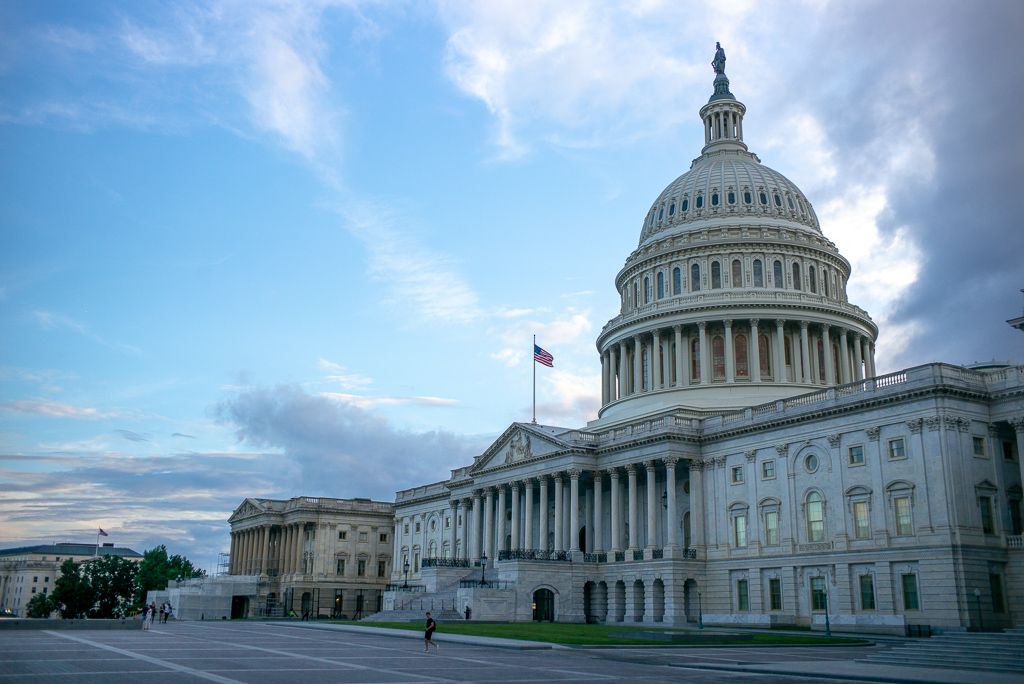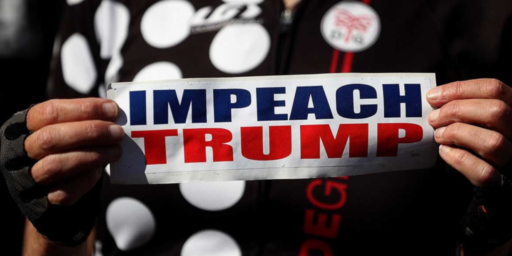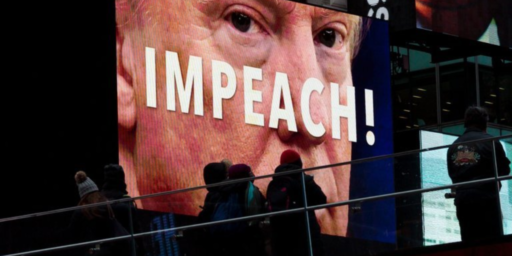House Blocks Impeachment Resolution Directed At President Trump
House Democrats rejected an effort by a member of the progressive wing of the party to force an impeachment inquiry against the President.

Late yesterday, the House of Representatives voted down a resolution introduced by an African-American Member of Congress to open an impeachment inquiry against the President, with even a majority of House Democrats rejecting the idea:
WASHINGTON — The House on Wednesday killed an attempt to impeach President Trump for statements that the chamber condemned this week as racist, turning aside an accusation that he had brought “ridicule, disgrace and disrepute” to his office.
The move split Democrats, underscoring the divisions within the party over whether they should use their majority to charge Mr. Trump and try to remove him from office, with 95 signaling their support for at least considering the question further, and 137 moving to stop the current effort in its tracks.
(…)
The 332-to-95 vote to table the impeachment article drafted by Representative Al Green, Democrat of Texas, constituted the first action by the House since Democrats took control in January on a measure to impeach Mr. Trump, a significant move that Speaker Nancy Pelosi of California and other party leaders have toiled to avoid. By agreeing to table the article, Ms. Pelosi and the Democrats put off — at least for now — a prolonged and divisive debate over whether Mr. Trump’s conduct warrants his expulsion.
But it was hardly the last word on the topic from Democrats torn about how to deal with the president, between progressives who want to challenge him more aggressively and moderates desperate to quash talk of impeachment and stick to a poll-tested agenda that includes improving health coverage and raising wages for working people.
Ms. Pelosi has been caught in the middle as she tries to maintain some semblance of control over the party’s agenda while Mr. Trump increasingly dictates the terms of the debate. Those dynamics have already dominated the House’s business this week. For two days, Democrats feuded with the president over his posts on Twitter about four freshman Democratic congresswomen of color.
“You have to give him credit: He’s a great distractor,” Ms. Pelosi, Democrat of California, said of Mr. Trump on Wednesday. She waved off questions about whether the Democrats’ policy priorities were being eclipsed by the president, saying, “We’re not having him set our agenda; we’re setting our own agenda.”
But in recent days, thanks to Mr. Trump’s penchant for stirring up the hottest of political controversies and simmering divisions within their own ranks, House Democrats have not seemed to be able to get out of their own way. This week has been a case in point.
Mr. Trump’s tweets prompted a rush by Democratic leaders to press a resolution condemning him. The vote on the measure took place on Tuesday, and the floor debate devolved into an extraordinarily polarizing spectacle as Republicans and Democrats argued about whether it was appropriate for Ms. Pelosi to have branded the president’s tweets “racist.”
Then Mr. Green’s decision to force action on his impeachment resolution stretched the narrative into Wednesday, overshadowing marquee Democratic issues, including a vote this week to raise the minimum wage to $15 and one to repeal a tax on high-cost employer-sponsored health plans.
“It’s time for us to deal with his bigotry,” Mr. Green said on Wednesday.
“This president has demonstrated that he’s willing to yell ‘fire’ in a crowded theater, and we have seen what can happen to people when bigotry is allowed to have a free rein. We all ought to go on record. We all ought to let the world know where we stand when we have a bigot in the White House.”
As a preliminary matter, it’s worth noting that Congressman Green’s impeachment resolution, which was introduced as a privileged motion meaning that the House had to vote on it whether the leadership wanted to it not, was not based on the grounds that have come to mind in impeachment discussions to date. It was not based on the Russia investigation or its allegations that the President’s campaign may have colluded with officials linked to the Russian Government and that the President sought to obstruct justice by seeking to undermine Special Counsel Mueller’s investigation. It was not based on the allegation that the President had conspired with his attorney Michael Cohen to violate campaign finance laws in the form of payments in late October 2016 to porn star Stormy Daniels and Playboy model Karen McDouglas. It was not based on the ongoing investigations of The Trump Organization and The Trump Foundation being conducted by the New York Attorney General and the U.S. Attorney for the Southern District of New York.
Instead, this resolution was based solely upon the President’s racist tweets. While these tweets are certainly offensive and unbecoming of a decent human being, never mind the President of the United States, it doesn’t seem to me that they rise to the level of the “high crimes and misdemeanors” that the Constitution authorizes as the basis for impeachment. For that reason alone, it was appropriate that the House vote down this impeachment resolution.
The one thing that this vote did do, though, is laid bare yet again the political battle that has been taking place for some time now inside the Democratic Caucus in the House over the issue of impeachment. On the one side are the progressives in the party such as Congressman Green and others who believe that the House ought to be moving immediately on impeachment. On the other side is Speaker Nancy Pelosi, the rest of the House Majority leadership and, it seems, the majority of the Democratic caucus who continue to believe that the time is not ripe for impeachment, not the least because it’s clear that an impeachment effort would be doomed to fail in the Republican-Senate. Also of concern is the fact that giving in to the call for impeachment would mean that the House would have to take its focus off of the policy initiatives that many believe will be needed to run an effective campaign in 2020.
I’ve shared my own thoughts on the issue of impeachment here and here. While I don’t dismiss the seriousness of the evidence against the President, the fact of the matter is that impeachment is, in the end, a political act and Democrats in the House would be wise to keep that in mind. As I’ve noted before, polling has indicated that the American public does not want to see Congress pursue impeachment at this time. To be sure. the same polling shows that there is significant support for impeachment among Democrats just as there is significant opposition to it among Republicans. Crucially, though, this same polling currently shows that a majority of self-identified Independents say they are opposed to impeachment at this time. Additionally, Congressional Democrats who talked to constituents back home and found little support for immediate moves to impeach the President even among Democrats. Instead, these voters want to see Congress focused on health care reform and other issues of importance to the average voter.
As I’ve said before, none of this should be taken to mean that Congress should stop investigating the President. In fact, it indicates quite the opposite. For the first two years of the Trump Presidency, the Republican-controlled Congress basically did nothing in response to the reports about wrongdoing by the Trump campaign, by the President in his private affairs, or by the Administration. It was in no small part due to this failure that Republicans suffered historic losses in the House of Representatives that caused them to lose more seats than they had since the elections that took place just three months after President Nixon resigned in 1974. In that sense, Democrats have a duty to act where Republicans refused to. If the evidence begins to point toward impeachment, and especially if the Administration continues to stonewall legitimate Congressional inquiries and requests for documents, then it may become necessary to open a formal impeachment inquiry in the Judiciary Committee. Before heading down that road, though, Democrats should proceed carefully.





I was hugely disappointed when I read a summary of the grounds for impeachment. Of all the things this administration appears to have done and appears to be doing, this was extremely weak tea on which to base a demand for impeachment.